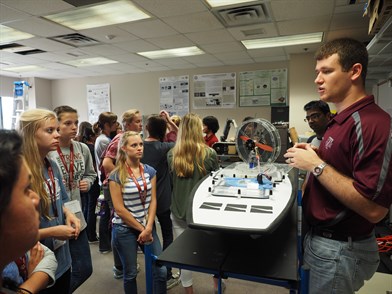Dr. Robin Murphy, Raytheon Professor, and her graduate students hosted a robot petting zoo for over 100 high school students in the Department of Computer Science and Engineering at Texas A&M University.
The students came from across Texas to participate in the Women in Engineering IDEAS summer camp. This six-day summer camp gives female high school students the opportunity to explore diverse aspects of engineering within the Dwight Look College of Engineering.
At the petting zoo, the students interacted with graduate students, tested robots, and learned about the life-saving technology. Grant Wilde, the ‘zoo keeper,’ educated students about the use of the robots and the research being conducted at Texas A&M.

“I enjoy the robot petting zoos because it gives students exposure to robots that have been used in real life disasters,” Wilde said.
In addition to educating the students, Wilde hopes to inspire them to have high goals.
“I believe exposing young students to robots and computer science at an early stage in their lives can really make an impact on them,” Wilde said. “In high school, I never saw myself working in a robotics lab because I had never been exposed to it.”
Wilde works as a graduate student with the Center for Robot Assisted Search and Rescue (CRASAR). The center is part of the Texas A&M Engineering Experiment Station and directed by Murphy.
Murphy uses robots to assist responders in emergency situations. Her research in emergency informatics involves collecting data with unmanned robots and efficiently analyzing the data. The data she provides allows responders to make decisions and reduce response time.
As one of the first females to work in emergency informatics, Murphy is passionate about inspiring young women to become involved in computer science.
“These young women have a great potential to impact the world through computer science and emergency informatics,” Murphy said. “I’m looking forward to seeing many of them come to the Department of Computer Science and Engineering”
For more information about emergency informatics, please visit crasar.org.